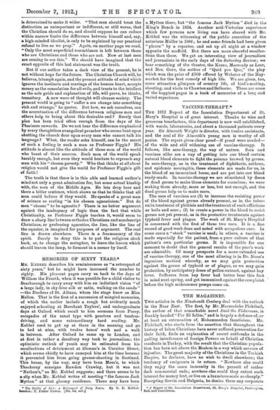VACCINE-THERAPY.* THE 1912 Report of the Inoculation Department of St.
Mary's Hospital is of great interest. Thanks to wise and generous benefactors, this department is now well established, with wards, laboratories, and about a thousand patients every year. Sir .Almroth Wright is director, with twelve assistants, and the zeal of Sir Almroth's young men is worthy of all praise. The report gives clear proof—if proof were needed— of the wide and still widening use of vaccine-therapy. It follows, like sero-therapy, the way of nature. Sera and vaccines alike are a way of getting into our blood certain natural blood elements to fight the poisons brewed by germs. In sero-therapy, as in the treatment of diphtheria, anthrax, and epidemic meningitis, these elements are made for us, in the blood of an immunized horse, and are put into our blood ready-made. In vaccine-therapy we are stimulated by doses of dead germs to make these elements for ourselves; we were making them already, more or less, but not enough, and the dead germs help us to make more.
The uses of vaccines are (1) to increase the resisting power of the blood against germs already present, as in the tuber- culin treatment of phthisis and the treatment of such afflictions as boils and acne ; (2) to create a power in the blood to resist germs not yet present, as in the protective treatments against typhoid fever and plague. The work of St. Mary's Hospital is concerned with the first of these two uses. It is a fine record of good work done and noted with scrupulous care. In some cases a " stock " vaccine is used; in others, a vaccine is made especially for the patient, from a pure culture of that patient's own particular germs. It is impossible for one moment to doubt that the general results of the year's work are admirable. Of many prospects for a more extended use of vaccine-therapy, one of the most alluring is in Dr. Noon's ingenious method whereby, as we may gain protection against the germs of typhoid or of plague, so we may gain protection, by anticipatory doses of pollen-extract, against hay fever. Sufferers from hay fever had better bear this fact in mind next spring, and get immunized against the complaint before the high midsummer pomps come on.






































































 Previous page
Previous page